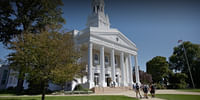Responding wisely to the environmental challenges humanity is certain to face in the coming century will require collaboration among experts in many fields: elected officials, government staff, environmental advocates, business leaders, scientists, lawyers, consultants, architects, religious leaders and many other professionals. Yet in a pluralist democracy, effective, farsighted environmental governance requires more than professional expertise.?
It also hinges on the thoughtfulness and responsibility of ordinary citizens in their roles as producers, consumers, parents, voters, and volunteers.?
The challenges for environmental studies at Bowdoin are twofold: to encourage broad environmental literacy through course offerings and co-curricular activities available to all students, and to build a solid foundation for the diverse environmentally-related career paths many of our graduates will follow.
Three convictions guide the design of Bowdoin's coordinate environmental studies major. First, students' academic foundation should be both disciplinary and inter-disciplinary, fostering an integrated understanding. Second, it should encompass perspectives from the curriculum's three broad divisions - humanities, natural science, and social science.?
Third, it should offer abundant opportunities for students to supplement their academic learning with experiences outside the classroom, helping them to discover their vocations, acquire practical skills, form lifelong habits, and develop networks of relationships.
Shaping a Sense of Place: From the Local to the Global
Bowdoin's location on the Maine coast and our resources for coastal studies are extraordinary assets that offer unique opportunities. The ES Program will encourage every student to experience the fascination of our place at the edge of the north Atlantic. We will do this by building on precedents that include courses, such as the present Gulf of Maine and land use planning seminars, and projects, such as the Merrymeeting Bay watershed planning and the Sustainable Bowdoin Initiative. And we will take advantage of exceptional facilities:?
the Orr's Island Coastal Studies Center, the Bowdoin Pines, and the Bowdoin Scientific Station on Kent Island.
Our view is not limited to the Maine coast, however. Bowdoin's ES faculty are involved in research and public policy initiatives affecting the rest of Maine and New England, including forest management, habitat protection, oil spill detection, transportation planning, sustainable agriculture, and ecotourism. Maine also frames the creative work of several participating faculty painters, photographers, architects, and writers. We seek to make Maine and northern New England a home and a laboratory for our students through courses, independent study and honors projects, research assistantships, internships, lectures, conferences, and opportunities for political engagement.









